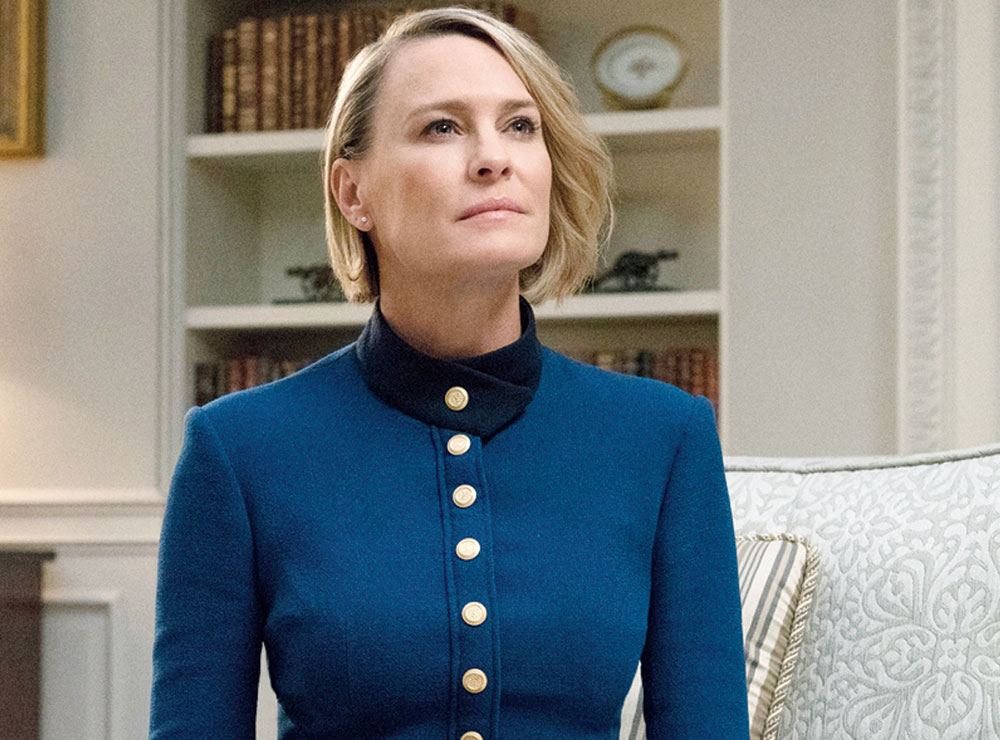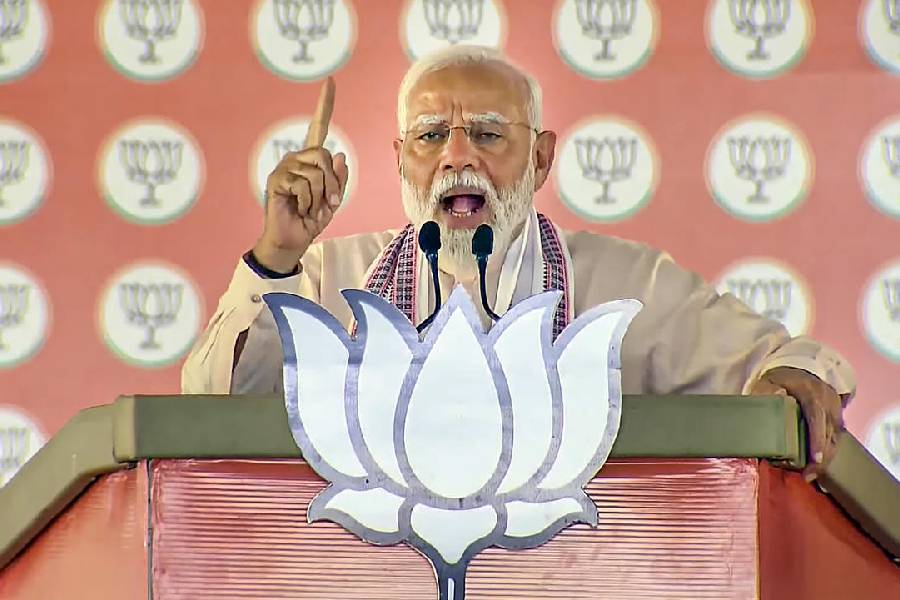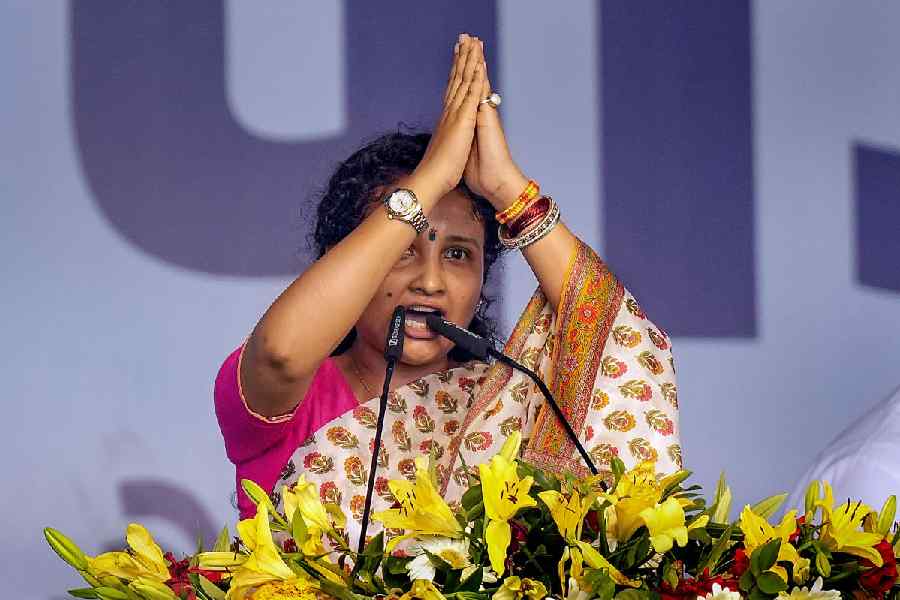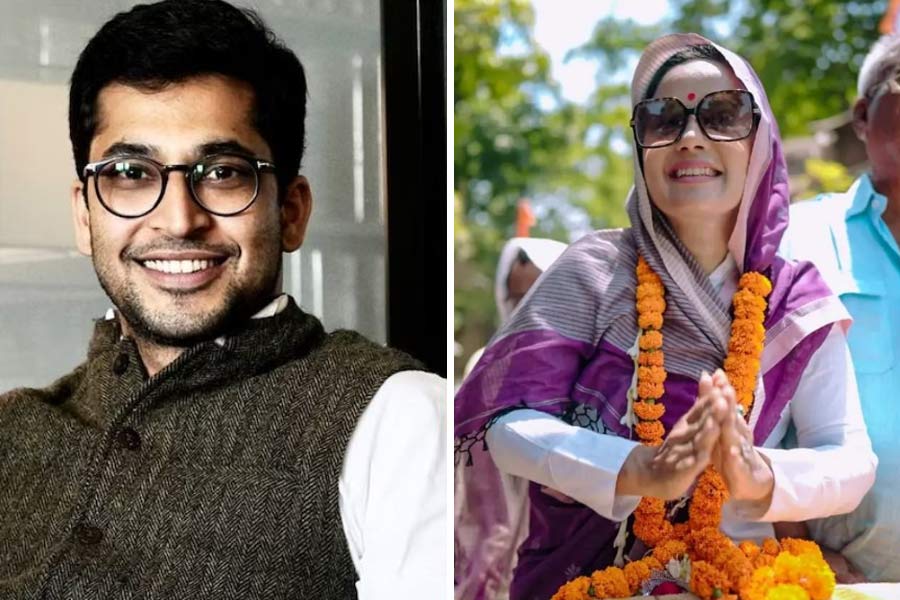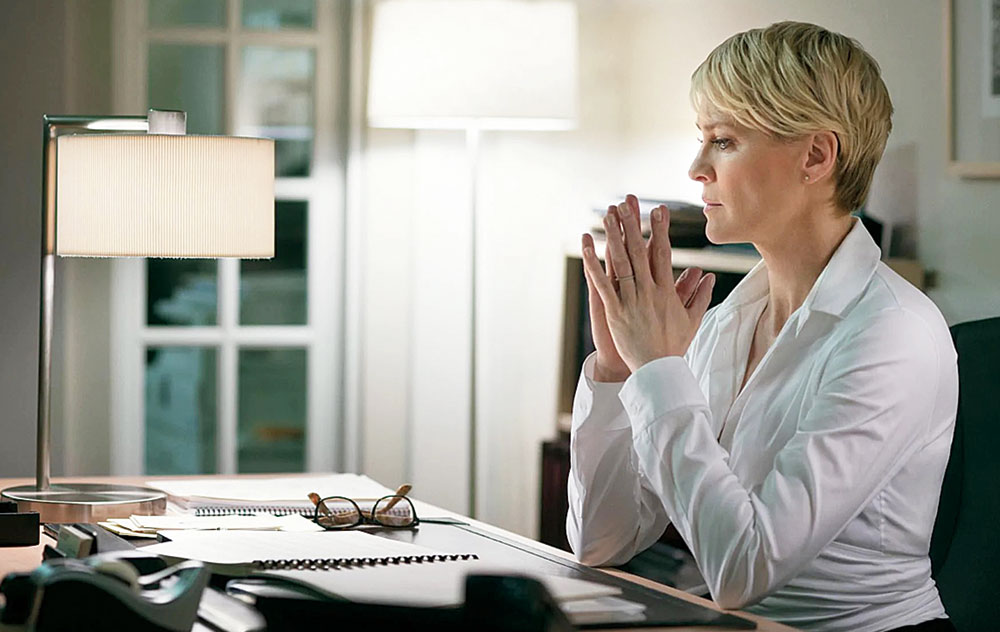
Robin Wright in a scene from House of Cards Picture courtesy: Netflix
Having watched her play the ruthless and steely Claire Underwood in Netflix’s House of Cards for six years, I thought Robin Wright in real life would be prickly and cold. I couldn’t be more wrong. We recently met the 52-year-old Amercian actress on the sidelines of Netflix’s See What’s Next: Asia event at the Marina Bay Sands in Singapore. Dressed in a tweed jacket, black jeans and Vans, Robin walked into the room with an actual bounce in her step. She is smiling. There’s no trace of Claire’s ramrod-straight posture, which Robin described as “the hardest part of playing her”, as she lounged on a plush sofa.
During an hour-long interaction with a select group of journalists, the actress spoke about everything from Claire Underwood’s wardrobe to continuing the show without Kevin Spacey, gender parity and being bitten by the “directing bug”.
The ending of House of Cards was a bit of a cliffhanger. Is there a possibility that after this final season there might be more of House of Cards?
No. We’ve said goodnight to House of Cards. It’s interesting though because a couple of people have also said they thought it was a cliffhanger. I never saw it that way. Maybe because it’s a streaming platform that you think, “Wow. This could go on... and on and on.”
How do you describe Claire Underwood?
Claire is an interesting fictional character because she was always meant to be the best of both sexes; to build a leader in a female body who’s also a man. She operates as a man would in certain aspects, and she operates the way a woman would simultaneously, within this environment of a very Shakespearean drama.
When House of Cards first came out, and we went to the Democratic National Convention dinner, actors sat at different tables with different politicians. I was sitting next to a Southern senator and he said: “God I love the show, it’s so real. It’s so accurate.” So, I asked him how accurate and he said 99 per cent. Then I asked him about the one per cent that wasn’t accurate, and he thought about it. I thought he was going to say, “Well people don’t go around murdering each other anymore.” (Laughs) But he didn’t say that. He said, “The only one per cent that’s not accurate is you would never get an education bill passed that fast.”
How involved were you in developing Claire through the six seasons?
Our writers were dependent on their advisors from (Washington) DC to understand that world and develop the characters. If Claire and Francis Underwood did this, what would be the repercussions in DC? We would get those answers and that would then influence how the scene was written and the exchanges that we would have. Then I would come in and say that I think Claire as a character would only say one of those four lines because she’s a woman of few words. And that kind of alteration would help build the arc of the episode. The hardest part about playing Claire was her posture. Having to sit up straight every day was not easy!
Claire is such an intimidating character. Do you find regular people reacting to you because they think of you as Claire?
People come up to me and go: “I’m so scared of you.” And then you can diffuse that with a smile and by telling them that’s so not me.
On the show, did the creators want bits that referenced current reality or stay completely away from current events, especially in light of the current administration?
That was always a challenge, because we would have an idea, but the episode wouldn’t air for another year. So, if it occurred in reality in between that time, we always had to catch ourselves. Sometimes, we would shoot a scene and it would happen in reality and we’d have to extract that scene and reshoot it with some other event. With the current administration, he (Donald Trump) literally stole our good ideas.
You had mentioned that a lot of thought was put into the colours used on the show. Is there a reason behind all the blues that Claire is wearing this season?
Kemal Harris, who was my stylist, agreed to come on the show three seasons ago to just focus on Claire. There was an agenda with designing for her each season, to ultimately get the “militaristic” look. We wanted to have that drop on her clothing and so the gold buttons on the presidential blue were supposed to be a little bit of a wink at an epaulette... as a General. It was very deliberate.
Your co-stars, Michael Kelly and Patricia Clarkson, have credited you with saving the show. What did you do when there was a crisis?
The crisis was going on as a current affair; it was a part of our social fabric. Everybody was alarmed and shocked as multiple things and people were hitting the news on a daily basis. And because the climate was so sensitive and hot at the same time, it was a conversation that we all had — me, the show-runners, Netflix, MRC (Media Rights Capital) — where we said we needed to take a pause here, let the dust settle and collectively decide on the best thing for the show and the fans.
We shut down to really assess the right thing to do and ultimately we discussed it after Christmas last year. We ended Season 5 with Claire breaking the fourth wall and going: “My turn”. We decided to explore that as we always intended and close it out for the fans. The real reason why I wanted it to continue was for over a 1,000 people to have employment in the state of Maryland, who had been given the assurance that they were going to have that security; people with children to feed, mortgages to pay and college tuition to tackle. It was insane! Were we just going to leave them in the dust? Not fair. So it was twofold — the reason to continue.
#MeToo has become a global movement…
I’m just happy that there is finally a microphone on the voice, so that we can wake up and change bad habits and a lack of boundaries. I think that’s great for the new generation, for kids. Yes, we’ve always been taught what is right and wrong. This movement is teaching people a new way of operating… of being decent (shrugs).
How much has House of Cards changed your life?
It opened a lot of doors, and being able to play that fierce female character is why I got Wonder Woman and Blade Runner. I’d been typecast for so many years in this industry as the quiet, pained, understanding wife.
When the show came your way all these years ago, did you expect it to be as big as it did? Did you think it would be a part of history, changing how the US and the rest of the world consumed television?
(Laughs) No. I remember telling David Fincher (executive producer) that I really didn’t want to do a TV show, and him explaining that this wasn’t really a TV show because it’s going to revolutionise television. “Don’t you want to be a part of that revolutionary idea? And you can develop a character where you’re not stunted with a one-and-a-half to two-hour window,” is how he sold House of Cards to me.
We had six seasons to develop our characters. We had no idea that it would go this long. David said to me: “I don’t think this show could survive more than two-three years because we’d be regurgitating the same ideas.” This is true for most shows. This went for six years, because there’s always someone who’s going to get the short end of the stick in Washington DC and everyone wants to see that (laughs).
What was it like to shoot the final season?
The end was bittersweet for all of us. It was time to close the chapter because we always knew that was the end of the story. She was always going to be female president. It was bittersweet because we spent more time with each other than we did with our own families, and great friendships were formed and a beautiful field of trust and support between all of us was built. It was an incredible crew, great cast, and we all loved working with each other so much, and we had so much fun. At the end of the shoot, a lot of tears were flowing in the Oval Office until 3am with a disco ball and a karaoke machine, and everyone was hugging and crying because this was it, it’s over.
Did you keep anything from the sets when the show wrapped?
They told the key actors that we could take one thing as a memento from the set, and there were two paintings of ships, next to each other. They looked like they were mirroring each other but going in different directions, and it looked like ships passing in the night. I took that because it was just so metaphorical — this ship is sailing on. And we were waving to each other and saying goodbye, it was a great ride.
You’ve talked about how the directing bug bit you after you directed an episode in the second season. How have you evolved as a filmmaker over these years?
I’m so grateful to have a family like I had in House of Cards, to have a support system like that. I learnt how to be a director on that show. This was my cinema school because we had some seasoned crew members on the show. Our camera operator (Gary Jay) has been in the business for 42 years, having worked with people like Oliver Stone, Michael Mann, Martin Scorsese, and he taught me how to look through a lens. He would ask me questions like: ‘What do you want, why do you want that, what lens would you pick because of that.’ I’m forever grateful for that. He would send me home with homework. “Go watch this film and I want you to tell me why Michael Mann used that lens, why did he use that shot in that scene, why did he focus on that actor versus the other one....” Incredible gift!
You have long been an advocate for equal work, equal pay. What are the changes that you’ve witnessed in the last 35 years in the industry? Now that you’re going to be calling the shots, do you think you’re going to take the fight forward?
I think the fight should be simply for equal work and equal pay. This is not just a broad comment on equality; it’s very specific. If I do exactly the same job as you for the same amount of hours, I should get paid the same. That’s all. And yes, I will push for that till the end. I have seen a change in the industry, I think we all have. Everybody’s speaking out and saying this is really not fair. I didn’t speak out in Season 1, when I was doing less and my character was on screen less and I wasn’t putting as many hours in as the other characters. It wasn’t until Season 3 that I realised that I’m getting paid a third. I think we really need to be clear on that line — this is not a generality. I have seen salaries go up for women because it’s now open in the room; this is not something that’s lying in the corner being silenced. It’s out there and studios and producers cannot deny it. And agents are pushing for their clients.
You’ve mentioned that you want to direct now. Who are the filmmakers you’ve worked with in the past that you’ve learnt the most from?
You learn something from every director that you work with. There are things that you would emulate and things you would never do. I’ve been in this business for 35 years, so that’s a lot of intel that you download. The one thing that stands out is to never use the word “don’t” on an actor: ‘Don’t put your hand like that or don’t do that’. That word is the most destructive for an actor.
The director I’ve learnt most of my positive attributes from was Anthony Minghella, who’s no longer with us. He was the most safe, trustworthy storyteller. He was a poet, so he knew how to lure you in as an artiste and feel safe with him. It’s a form of manipulation but I knew it was something to trust. He didn’t just give you active verbs to play. For example, he wouldn’t say, “Can you be more incredulous in this take?” He would talk you through a story that would help you embody the moment.
Can you give us a sense of what a Robin Wright film would be like?
There’s nothing isolated thematically. I would like to do an old Woody Allen-style comedy with smart dialogues or a beautiful love story. The one that I’m about to direct next winter is about a woman who loses her husband and child to a terrorist bomb, and how she deals with the grief. We, as a society, try to pull people out of their grief and think it’s time to re-enter society, but she can’t re-enter because she realises she can’t be good for society being that person in grief. She goes out into the wilderness to live alone. She meets an Indian man who teaches her how to love life again and to not be just wallowing on your own. He’s had a tremendous amount of loss. So, it’s a beautiful love story about how to survive and love people again.
Being a director means a lot of responsibility. Has it ever been daunting for you?
In the beginning, it was daunting because I honestly believed that I was sailing the ship; it was all up to me. And it’s actually the antithesis of that, being the director. When you’re an actor, it’s more so that because it’s such a soloist act — you are sailing the ship of that character, nobody else is. You’d better build who that character is or you have failed, and that affects other characters and the story. But as a director, you are dependent on all of the other departments and we’re all architects of that building — the production designer, the casting department, the props department. Having every department head be a part of your vision, they’re all making it with you — we all did it together.
In every film industry, woman directors have a hard time getting films made. Have you experienced this as yet?
Not yet but I am sure I will find this out soon. I think it’s a necessity to have women tell their stories. So, we need to continue putting ourselves out there, insist that we are up for the same films as male directors. For example, I just lost a film I really wanted to direct, and it was a big studio movie. I lost it to a male director, and he’s a great director. I was told that they didn’t want to give it to “the rookie”. Well the rookie is going to keep banging on that door until they let me prove myself. And yes I’m new and not as skilled but I am going to get better only if they let me direct more. We are just going to have to keep calling, keep the emails going and knocking on doors until they let us in.
What’s happening with General Antiope in Wonder Woman 2?
It’s another flashback. As us Amazons never die, we also never age apparently which is so great (laughs). And she’s again teaching Diana a history lesson that she will use in her adulthood as Wonder Woman.

